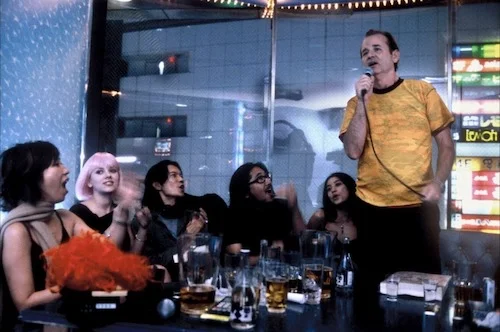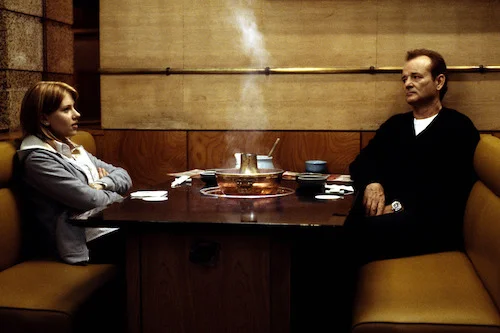Lost in Translation: The Accuracy of Sofia Coppola's Depictions of "The Now"
If you haven't heard the latest announcement, filmmaker Sofia Coppola is teaming up with Bill Murray for a new film titled On the Rocks. Rashida Jones will play Murray's daughter, and the two will try to reconnect after many years of drifting apart. This will be the first film under A24's deal with Apple (how indie-yet-corporate can you get?) as a means for Apple to create original material like Amazon or YouTube are. Of course this is a cause of celebration. We’re seeing Murray reenact Coppola's vision for the first time in sixteen years.
Of course I am referring to Lost in Translation: one of the pivotal works of the early new millennium. Murray starred in this existential crisis as the forgotten Hollywood icon Bob Harris. He is temporarily in Japan to do some television spots. He finds some unity within s recent college graduate named Charlotte (played by Scarlett Johansson); suddenly, the confusing pop culture of Japan turns into a mystical wonderland.
This article is sixteen years too late, but it may not be late at all. Lost in Translation -- a genius work by Coppola -- has seemingly not lost its relevancy even nearly two decades later. In a cyber-connected world, we can choose to embrace the unknown or drift into our own little worlds via mobile phones, music devices, gaming consoles and more. I am writing this article on a bus; I am definitely on the bus, but I am not present on said vehicle. Lost in Translation honours the great divide between our personal bubbles and the landscapes we may be forgetting about (despite the fact that we are in them).
Shoegaze is the ideal music to get lost in. With so much fuzz and so many walls of sonic noise, it is hard to grab onto one general sound. You either dig deep and find the most specific tone, or you allow yourself to free fall into a cacophanic bliss. Coppola came up with the idea for Lost in Translation once she herself was lost in Japan. She zeroed in on the album Loveless by My Bloody Valentine, and her panic turned into utopia. This was no longer a city she couldn't find her way through. This was her dream, and she could command the unknowns she wished to explore.
A scene from Lost in Translation
Naturally, she got Kevin Shields (of My Bloody Valentine) to create the score. Some original tracks were created, and some songs of his choice were picked (including “Sometimes” by his own band, and “Just Like Honey” by The Jesus and Mary Chain). Part of the soundtrack is original. Part of it is compiled. This is the drifting in-and-out of familiarity that the film so perfectly replicates.
Japan, as presented in the film, is so technologically advanced and yet so organic. Outside of a super arcade, there is a zen garden. Sometimes, our aimlessness is a mad chaos, but it can be oddly tranquil, too. Are we texting and walking to work? We could just be reading on our Kindle devices in the middle of the park. It doesn't have to be hectic. In Lost in Translation, there are two worlds: the one around you, and the one you are currently experiencing. Right now, are you reading this article on a device? It's online. You would have to be. That was exactly Coppola's point way before we even had smart phones. The iPod was still on the rise, and it still had room to improve storage and GUI-wise. We, as a planet, have never been so connected but disconnected at the same time.
Charlotte's husband, John, is a photographer who is following actress Kelly around Japan on assignment. Even this guy is capturing a new world to him, but how much of that time has he spent living in it? This is why Bob and Charlotte connect so heavily at first. They meet at a lobby bar, unsure of how to truly embrace the new world around them. With the push they give one another, they begin to explore deeper and deeper into the subcultures of Japan. The karaoke scene is so powerful, and it isn't because we hear the stars singing. We see them getting lost, on purpose, in the deepest corridors of the labyrinth of life and not caring about getting out. Sure, they are using an electronic device (a karaoke set), but they are embracing each other and their vulnerabilities. Charlotte sings candidly. Bob sings poorly (but we love him for it). We can't even howl at his awful attempt at singing a Roxy Music track. Instead, we too are there feeling it. It isn't about the talent. It's about the escape.
Bob and Charlotte in Lost in Translation
Bob is hounded by people that love him (his family back home); they pester because they care, and he wishes to be distanced. He even leaps from Charlotte once things get too familiar with her. His gig in Japan isn't what he hoped for; he doesn't quite soak in Tokyo like Charlotte does. Instead, Bob wishes to stray away from his mechanical life, yet he indulges in his usual habits. He plays golf. He drinks. He stays at the hotel room and watches television. How present is he? Truly?
By the climactic end, when Bob realizes he is leaving Japan and no longer has an excuse to run away from Charlotte because he is on his way out, he demands that his taxi stops, and he leaps out and gets lost in the streets looking for her. They reunite, and they share a moment: a kiss and a whispered message we cannot hear (disclaimer: I know what Bob says has been revealed, but we weren't supposed to know, and it's better that way). For once, Bob was direct. No hiding. No habits. No zeroing in on his own world. He fully embraced Charlotte on his own accord, without him getting anything out of it (outside of solace, maybe).
Lost in Translation is sixteen years old, but it only gets more important as it ages. Our world is so small with how connected we all are, and yet we have never been so disconnected at the same time. Coppola was talking about her present through the film, but she somehow predicted that it was going to get worse. Yes, there is something beautiful with using what we have to create our own lenses on the world around us. Put on that album. Scroll through your feed. Text your loved ones. Lost in Translation is also reminding us to take a second, though, and look up. Truly look around without intending on looking down at your phone a second later. Really get a sense of where you are. There's another reality right here that deserves your attention, and you will be grateful for it.
Andreas Babiolakis has a Masters degree in Film and Photography Preservation and Collections management from Ryerson University, as well as a Bachelors degree in Cinema Studies from York University. His favourite times of year are the Criterion Collection flash sales and the annual Toronto International Film Festival.




